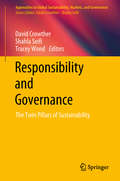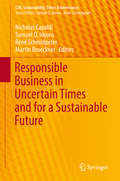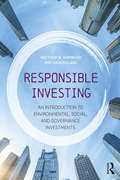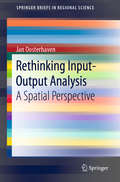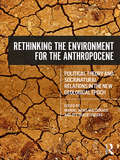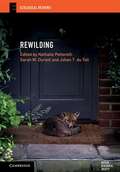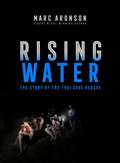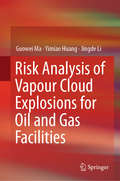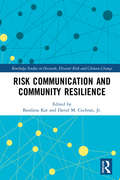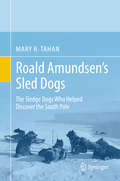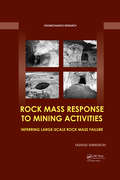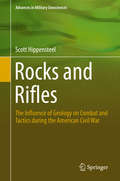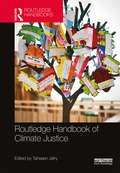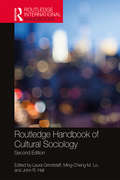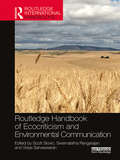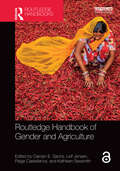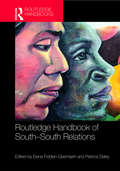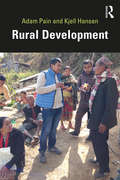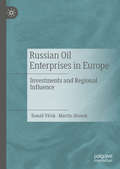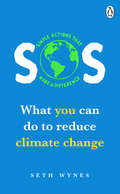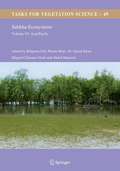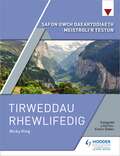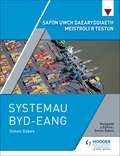- Table View
- List View
Responsibility and Governance: The Twin Pillars of Sustainability (Approaches to Global Sustainability, Markets, and Governance #8)
by David Crowther Shahla Seifi Tracey WondThis book examines various aspects of changes to business behavior through the lenses of the “twin pillars” of sustainability – responsibility and governance. It discusses whether the focus of corporate social responsibility has changed so much that we need to think about redefinitions of key concepts in the field, and analyses both the theory and practice in a variety of ways to enable conclusions to be drawn about the changes needed to any definitions.This approach is based on the tradition of the Social Responsibility Research Network, which in its 15-year history has sought to broaden the discourse and to treat all research as inter-related and relevant to business. This book consists of the best contributions from the 16th International Conference on Corporate Social Responsibility and 7th Organisational Governance Conference held in Derby, United Kingdom in August/September 2017.
Responsible Business in Uncertain Times and for a Sustainable Future (CSR, Sustainability, Ethics & Governance)
by Nicholas Capaldi Samuel O. Idowu René Schmidpeter Martin BruecknerThis book offers up-to-date insights into the theory and practice of Corporate Social Responsibility (CSR) and sustainability management. Gathering contributions by a team of international scholars, it shares perspectives from a variety of academic disciplines, including management and tourism as well as accounting, higher education research and supply chain management. Guided by the credo of achieving 'Responsible Business for Uncertain Times and a Sustainable Future,' the authors present their latest reflections on, and possible solutions for, sustainable and responsible business practices. All of the contributions presented here are critical, evidence-based and solution-oriented, making the book both practical and insightful reading for academics and practitioners alike.
Responsible Investing: An Introduction to Environmental, Social, and Governance Investments
by Matthew W. Sherwood Julia PollardThis textbook provides the first holistic resource on Environmental, Social, and Governance (ESG) investing for undergraduate and graduate programs. It provides a thorough background and history of ESG investing, as well as cutting-edge industry developments, in a way that introduces the reader to the rapidly developing field of responsible investing. Beginning with a comprehensive background of ESG investing and the development of models measuring risk and return, the book then discusses the development of ESG risks, and provides an overview of ESG rating systems. The textbook also outlines the current position of ESG investing in portfolio management through granular analysis, provides insight into common investor concerns about ESG investments, discloses qualitative theories relevant to ESG investing, and reviews literature attempting to model ESG investment performance. Finally, the authors provide readers with a foundation on the development of financial models measuring risk and return, which will be useful for measuring the performance of ESG investments. With case studies from contributors around the world, this textbook is the first of its kind to truly provide a compelling blend of quantitative and qualitative analysis supporting the incorporation of ESG investment strategies into investment portfolios. Offering an excellent overview of the growing trends in ESG investing, as well as a close analysis of ESG theories and their practical application both today and in the future, this book will be a great resource for both undergraduates and graduate students.
Rethinking Input-Output Analysis: A Spatial Perspective (SpringerBriefs in Regional Science)
by Jan OosterhavenThis book highlights the social, economic and environmental importance of the mutual relations between industries in the same and in different regions and nations, and demonstrates how to model these relations using regional, interregional and international input-output (IO) models. It enables readers familiar with standard matrix algebra to extend these basic IO models with endogenous household expenditures, to employ supply-use tables (SUTs) that explicitly distinguish the products used and sold by industry, and to use Social Accounting Matrices (SAMs) that detail the generation, redistribution and spending of income. In addition to the standard demand-driven IO quantity model and its accompanying cost-push IO price model, the book also discusses the economic assumptions and usefulness of the supply-driven IO quantity model and its accompanying revenue-pull IO price model. The final chapters highlight three main applications of the IO model: (1) economic impact analysis of negative supply shocks as caused by, for example, natural disasters, (2) linkages, key sector and cluster analysis, (3) structural decomposition analysis, especially of regional, interregional and international growth, and demonstrate the strengths and weaknesses of these IO applications. This book appeals to economists and planners as well as scholars of regional and spatial science.
Rethinking the Environment for the Anthropocene: Political Theory and Socionatural Relations in the New Geological Epoch
by Manuel Arias-Maldonado Zev TrachtenbergThis book brings together the most current thinking about the Anthropocene in the field of Environmental Political Theory ('EPT'). It displays the distinctive contribution EPT makes to the task of thinking through what 'the environment' means in this time of pervasive human influence over natural systems. Across its chapters the book helps develop the idea of 'socionatural relations'—an idea that frames the environment in the Anthropocene in terms of the interconnected relationship between human beings and their surroundings. Coming from both well-established and newer voices in the field, the chapters in the book show the diversity of points of view theorists take toward the Anthropocene idea, and socionatural relations more generally. However, all the chapters exemplify a characteristic of work in EPT: the self-conscious effort to provide normative interpretations that are responsive to scientific accounts. The Introduction explains the complicated interaction between science and EPT, showing how it positions EPT to consider the Anthropocene. And the Afterword, by a pioneer in the field, relates all the chapters to a perspective that has been deeply influential in EPT. This book will be of interest to scholars already engaged in EPT. But it will also serve as an introduction to the field for students of Political Theory, Philosophy, Environmental Studies, and related disciplines, who will learn about the EPT approach from the Introduction, and then see it applied to the pressing question of the Anthropocene in the ensuing chapters. The book will also help readers interested in the Anthropocene from any disciplinary perspective develop a critical understanding of its political meanings.
Rewilding (Ecological Reviews)
by Nathalie Pettorelli Sarah M. Durant Johan T. du ToitThrough a global and interdisciplinary lens, this book discusses, analyzes and summarizes the novel conservation approach of rewilding. The volume introduces key rewilding definitions and initiatives, highlighting their similarities and differences. It reviews matches and mismatches between the current state of ecological knowledge and the stated aims of rewilding projects, and discusses the role of human action in rewilding initiatives. Collating current scholarship, the book also considers the merits and dangers of rewilding approaches, as well as the economic and socio-political realities of using rewilding as a conservation tool. Its interdisciplinary nature will appeal to a broad range of readers, from primary ecologists and conservation biologists to land managers, policy makers and conservation practitioners in NGOs and government departments. Written for a scientifically literate readership of academics, researchers, students, and managers, the book also acts as a key resource for advanced undergraduate and graduate courses.
Rising Water: The Story of the Thai Cave Rescue
by Marc AronsonThe incredible true story of the twelve boys trapped with their coach in a flooded cave in Thailand and their inspiring rescue—as seen in Ron Howard's Thirteen Lives.On June 23, 2018, twelve members of the Wild Boars soccer team and their coach were exploring the Tham Luang cave complex in northern Thailand when disaster struck. A rainy season downpour flooded the tunnels, trapping them as they took shelter on a shelf of the dark cave. Eight days of searching yielded no signs of life, but on July 2 they were discovered by two British divers. The boys and their coach were eventually rescued in an international operation that took three days. What could have been a terrible tragedy became an amazing story of survival. Award-winning author Marc Aronson brings us the backstory behind how this astounding rescue took place. Rising Water highlights the creative thinking and technology that made a successful mission possible by examining the physical, environmental, and psychological factors surrounding the rescue. From the brave Thai Navy SEAL who lost his life while placing oxygen tanks along the passageways of the cave, to the British divers that ultimately swam the boys to safety, to the bravery of the boys and their coach, this is the breathtaking rescue that captivated the entire world.
Risk Analysis of Vapour Cloud Explosions for Oil and Gas Facilities
by Guowei Ma Yimiao Huang Jingde LiThis book focuses on describing and applying risk analysis of vapour cloud explosions (VCEs) in various oil and gas facilities, such as petrol stations, processing plants, and offshore platforms. Discussing most of the complicated features of gas explosion accidents, the book studies in detail the gas explosion risk analysis approaches of different oil and gas facilities in order to develop more accurate, detailed, efficient and reliable risk analysis methods for VCEs under different conditions. Moreover, it introduces an advanced overpressure approach to predict VCEs using computational fluid dynamics (CFD) modelling, and details applications of CFD using a FLame ACceleration Simulator (FLACS). The book is intended for researchers and organisations engaged in risk and safety assessments of VCEs in the oil and gas industry.
Risk Communication and Community Resilience (Routledge Studies in Hazards, Disaster Risk and Climate Change)
by David M. Cochran Bandana KarRisk communication is crucial to building community resilience and reducing risk from extreme events. True community resilience involves accurate and timely dissemination of risk information to stakeholders. This book examines the policy and science of risk communication in the digital era. Themes include public awareness of risk and public participation in risk communication and resilience building. The first half of the book focuses on conceptual frameworks, components, and the role of citizens in risk communication. The second half examines the role of risk communication in resilience building and provides an overview of some of its challenges in the era of social media. This book looks at the effectiveness of risk communication in socially and culturally diverse communities in the developed and developing world. The interdisciplinary approach bridges academic research and applied policy action. Contributions from Latin America and Asia provide insight into global risk communication at a time when digital technologies have rapidly transformed conventional communication approaches. This book will be of critical interest to policy makers, academicians, and researchers, and will be a valuable reference source for university courses that focus on emergency management, risk communication, and resilience.
Roald Amundsen’s Sled Dogs: The Sledge Dogs Who Helped Discover the South Pole
by Mary R. TahanThis book is an analytical account of how Roald Amundsen used sledge dogs to discover the South Pole in 1911, and is the first to name and identify all 116 Polar dogs who were part of the Norwegian Antarctic Expedition of 1910–1912. The book traces the dogs from their origins in Greenland to Antarctica and beyond, and presents the author’s findings regarding which of the dogs actually reached the South Pole, and which ones returned.Using crewmember diaries, reports, and written correspondence, the book explores the strategy, methodology, and personal insights of the explorer and his crew in employing canines to achieve their goal, as well as documents the controversy and internal dynamics involved in this historic discovery. It breaks ground in presenting the entire story of how the South Pole was truly discovered using animals, and how deep and profound the differences of perception were regarding the use of canines for exploration.This historic tale sheds light on Antarctic exploration history and the human-nature relationship. It gives recognition to the significant role that animals played in this important part of history.
Rock Mass Response to Mining Activities: Inferring Large-Scale Rock Mass Failure (Geomechanics Research)
by Tadeusz SzwedzickiMining activities may result in rock mass deterioration and instability that may lead to failure both in underground and open pit mines. Such deterioration represents a safety risk and may result in substantial financial losses. Rock mass response may lead to ground subsidence, fall of ground/caving, inundation, pillar collapse, seismic activities and slope and tailings dam instability. Each response is preceded by warning signs and precursors, which are identified in this book, with a view to providing guidelines for prediction and amelioration of damage to mining structures. Furthermore, case studies of both large scale ground deterioration leading to collapse and geotechnical mine disasters are presented. Identifying risks and monitoring geotechnical precursors and warning signs allows for safe and productive mining.
Rocks and Rifles: The Influence of Geology on Combat and Tactics during the American Civil War (Advances in Military Geosciences)
by Scott HippensteelThis book discusses the relationship between geology and fighting during the American Civil War. Terrain was largely determined by the underlying rocks and how the rocks weathered. This book explores the difference in rock type between multiple battlegrounds and how these rocks influenced the combat, tactics, and strategies employed by the soldiers and their commanding officers at different scales.
Routledge Handbook of Climate Justice (Routledge Environment and Sustainability Handbooks)
by Tahseen Jafry Michael Mikulewicz Karin HelwigThe term "climate justice" began to gain traction in the late 1990s following a wide range of activities by social and environmental justice movements that emerged in response to the operations of the fossil fuel industry and, later, to what their members saw as the failed global climate governance model that became so transparent at COP15 in Copenhagen. The term continues to gain momentum in discussions around sustainable development, climate change, mitigation and adaptation, and has been slowly making its way into the world of international and national policy. However, the connections between these remain unestablished. Addressing the need for a comprehensive and integrated reference compendium, The Routledge Handbook of Climate Justice provides students, academics and professionals with a valuable insight into this fast-growing field. Drawing together a multidisciplinary range of authors from the Global North and South, this Handbook addresses some of the most salient topics in current climate justice research, including just transition, urban climate justice and public engagement, in addition to the field’s more traditional focus on gender, international governance and climate ethics. With an emphasis on facilitating learning based on cutting-edge specialised climate justice research and application, each chapter draws from the most recent sources, real-world best practices and tutored reflections on the strategic dimensions of climate justice and its related disciplines. The Routledge Handbook of Climate Justice will be essential reading for students and scholars, as well as being a vital reference tool for those practically engaged in the field.
Routledge Handbook of Cultural Sociology: 2nd Edition (Routledge International Handbooks)
by John R. Hall Laura Grindstaff Ming-Cheng M. LoThe thoroughly revised and updated second edition of the Routledge Handbook of Cultural Sociology provides an unparalleled overview of sociological and related scholarship on the complex relations of culture to social structures and everyday life. With 70 essays written by scholars from around the world, the book brings diverse approaches into dialogue, charting new pathways for understanding culture in our global era. Short, accessible chapters by contributing authors address classic questions, emergent issues, and new scholarship on topics ranging from cultural and social theory to politics and the state, social stratification, identity, community, aesthetics, and social and cultural movements. In addition, contributors explore developments central to the constitution and reproduction of culture, such as power, technology, and the organization of work. This handbook is essential reading for undergraduate and postgraduate students interested in a wide range of subfields within sociology, as well as cultural studies, media and communication, and postcolonial theory.
Routledge Handbook of Ecocriticism and Environmental Communication (Routledge International Handbooks)
by Scott Slovic Swarnalatha Rangarajan Vidya SarveswaranEcocriticism and environmental communication studies have for many years co-existed as parallel disciplines, occasionally crossing paths but typically operating in separate academic spheres. These fields are now rapidly converging, and this handbook aims to reinforce the common concerns and methodologies of the sibling disciplines. The Routledge Handbook of Ecocriticism and Environmental Communication charts the history of the relationship between ecocriticism and environmental communication studies, while also highlighting key new paradigms in information studies, diverse examples of practical applications of environmental communication and textual analysis, and the patterns and challenges of environmental communication in non-Western societies. Contributors to this book include literary, film and religious studies scholars, communication studies specialists, environmental historians, practicing journalists, art critics, linguists, ethnographers, sociologists, literary theorists, and others, but all focus their discussions on key issues in textual representations of human–nature relationships and on the challenges and possibilities of environmental communication. The handbook is designed to map existing trends in both ecocriticism and environmental communication and to predict future directions. This handbook will be an essential reference for teachers, students, and practitioners of environmental literature, film, journalism, communication, and rhetoric, and well as the broader meta-discipline of environmental humanities.
Routledge Handbook of Gender and Agriculture
by Carolyn E. Sachs, Leif Jensen, Paige Castellanos, and Kathleen SexsmithThe Routledge Handbook of Gender and Agriculture covers major theoretical issues as well as critical empirical shifts in gender and agriculture. Gender relations in agriculture are shifting in most regions of the world with changes in the structure of agriculture, the organization of production, international restructuring of value chains, climate change, the global pandemic, and national and multinational policy changes. This book provides a cutting-edge assessment of the field of gender and agriculture, with contributions from both leading scholars and up-and-coming academics as well as policymakers and practitioners. The handbook is organized into four parts: part 1, institutions, markets, and policies; part 2, land, labor, and agrarian transformations; part 3, knowledge, methods, and access to information; and part 4, farming people and identities. The last chapter is an epilogue from many of the contributors focusing on gender, agriculture, and shifting food systems during the coronavirus pandemic. The chapters address both historical subjects as well as ground-breaking work on gender and agriculture, which will help to chart the future of the field. The handbook has an international focus with contributions examining issues at both the global and local levels with contributors from across the world. With contributions from leading academics, policymakers, and practitioners, and with a global outlook, the Routledge Handbook of Gender and Agriculture is an essential reference volume for scholars, students, and practitioners interested in gender and agriculture.
Routledge Handbook of South-South Relations (Routledge International Handbooks)
by Elena Fiddian-Qasmiyeh Patricia DaleySouth-South cooperation is becoming ever more important to states, policy-makers and academics. Many Northern states, international agencies and NGOs are promoting South-South partnerships as a means of ‘sharing the burden’ in funding and undertaking development, assistance and protection activities, often in response to increased political and financial pressures on their own aid budgets. However, the mainstreaming of Southern-led initiatives by UN agencies and Northern states is paradoxical in many ways, especially because the development of a South-South cooperation paradigm was originally conceptualised as a necessary way to overcome the exploitative nature of North-South relations in the era of decolonisation. This handbook critically explores diverse ways of defining ‘the South’ and of conceptualising and engaging with ‘South-South relations.’ Through 30 state-of-the-art reviews of key academic and policy debates, the handbook evaluates past, present and future opportunities and challenges of South-South cooperation, and lays out research agendas for the next 5-10 years. The book covers key models of cooperation (including internationalism, Pan-Arabism and Pan-Africanism), diverse modes of South-South connection, exchange and support (including South-South aid, transnational activism, and migration), and responses to displacement, violence and conflict (including Southern-led humanitarianism, peace-building and conflict resolution). In so doing, the handbook reflects on decolonial, postcolonial and anticolonial theories and methodologies, exploring urgent questions regarding the nature and implications of conducting research in and about the global South, and of applying a ‘Southern lens’ to a wide range of encounters, processes and dynamics across the global South and global North alike. This handbook will be of great interest to scholars and post-graduate students in anthropology, area studies, cultural studies, development studies, history, geography, international relations, politics, postcolonial studies and sociology.
Rural Development
by Adam Pain Kjell HansenRural Development is a textbook that critically examines economic, social and cultural aspects of rural development efforts both in the global north and in the global south. By consistently using examples from the north and the south the book highlights similarities of processes as well as differences in contexts. The authors’ knowledge of Afghanistan and Sweden respectively creates a core for the discussions which are complemented with a wide range of other empirical examples. Rural Development is divided into nine chapters, each with a thematic focus, ranging from concepts and theories through rural livelihoods and natural resources to discussions on policy and processes of change. The book sees rural development as a multi-level, multi-actor and multi-faceted subject area that needs multidisciplinary perspectives both to support it and to analyse it. Throughout the book examples of rural development interventions are discussed using analytical concepts such as power, discourse, consequences and context to grasp rural development as practices that are more than what is presented in policy documents. The book is written in a way that makes it accessible for undergraduates while at the same time caters for the kind of deeper reading used by master students and Ph.D.’s. Every chapter is linked to discussion questions as well as suggested further readings and useful websites.
Russian Oil Enterprises in Europe: Investments and Regional Influence
by Tomáš Vlček Martin JirušekThis book analyzes motivation, investments, and influence of the Russian Federation and Russian companies in the European oil sector, specifically, the Southeastern Europe. The main idea of the book is to highlight economic and political logic of the Russian activities in the oil sector as well as to provide a brief analysis of the situation in the natural gas sector. The findings help to understand the general code of conduct of Russian energy companies and their potential ties to their homeland government. This project will appeal to academics, researchers, graduate students, field professionals, and everyone who is interested in Russian and European geopolitics.
SOS: What you can do to reduce climate change – simple actions that make a difference
by Seth Wynes'The most effective ways for individuals to reduce their carbon footprint' INewsClimate Change researcher, Seth Wynes, sets out in the simplest terms how you can make a real and positive impact.Make changes at home, at work, to how you shop, eat, live - start by finding one thing your family can change with this book and do it today. What you do matters - and the science proves it. How many actions can you tick of the list in this book to help save our planet?
Sabkha Ecosystems: Volume VI: Asia/Pacific (Tasks for Vegetation Science #49)
by Benno Böer M. Ajmal Khan Miguel Clüsener-Godt Bilquees Gul Abdul HameedThis book is the sixth and final volume in the Tasks for Vegetation Science book series, and it concludes the most comprehensive scientific documentation dealing with hypersaline ecosystems of the world.
Safon Uwch Daearyddiaeth Meistroli'r Testun: Tirweddau Rhewlifedig
by Nicky KingExam board: AQA, Edexcel, OCR, WJEC/EduqasLevel: A-levelSubject: GeographyFirst teaching: September 2016First exams: Summer 2017 (AS); Summer 2018 (A-level)Master the in-depth knowledge and higher-level skills that A-level Geography students need to succeed; this focused topic book extends learning far beyond your course textbooks.Blending detailed content and case studies with questions, exemplars and guidance, this book:- Significantly improves students' knowledge and understanding of A-level content and concepts, providing more coverage of Glaciated Landscapes than your existing resources- Strengthens students' analytical and interpretative skills through questions that involve a range of geographical data sources, with guidance on how to approach each task- Demonstrates how to evaluate issues, with a dedicated section in every chapter that shows how to think geographically, consider relevant evidence and structure a balanced essay- Equips students with everything they need to excel, from additional case studies and definitions of key terminology, to suggestions for further research and fieldwork ideas for the Independent Investigation- Helps students check, apply and consolidate their learning, using end-of-chapter refresher questions and discussion points, plus tailored advice for the AQA, Edexcel, OCR and WJEC/Eduqas specifications- Offers trusted and reliable content, written by a team of highly experienced senior examiners and reviewed by academics with unparalleled knowledge of the latest geographical theories
Safon Uwch Daearyddiaeth Meistroli’r Testun: Systemau Byd-eang
by Simon OakesMaster the in-depth knowledge and higher-level skills that A-level Geography students need to succeed; this focused topic book extends learning far beyond your course textbooks.Blending detailed content and case studies with questions, exemplars and guidance, this book:- Significantly improves students' knowledge and understanding of A-level content and concepts, providing more coverage of Global Systems than your existing resources- Strengthens students' analytical and interpretative skills through questions that involve a range of geographical data sources, with guidance on how to approach each task- Demonstrates how to evaluate issues, with a dedicated section in every chapter that shows how to think geographically, consider relevant evidence and structure a balanced essay- Equips students with everything they need to excel, from additional case studies and definitions of key terminology, to suggestions for further research and fieldwork ideas for the Independent Investigation- Helps students check, apply and consolidate their learning, using end-of-chapter refresher questions and discussion points- Offers trusted and reliable content, written by a team of highly experienced senior examiners and reviewed by academics with unparalleled knowledge of the latest geographical theories
Safon Uwch Daearyddiaeth Meistroli’r Testun: Systemau Byd-eang
by Simon OakesMaster the in-depth knowledge and higher-level skills that A-level Geography students need to succeed; this focused topic book extends learning far beyond your course textbooks.Blending detailed content and case studies with questions, exemplars and guidance, this book:- Significantly improves students' knowledge and understanding of A-level content and concepts, providing more coverage of Global Systems than your existing resources- Strengthens students' analytical and interpretative skills through questions that involve a range of geographical data sources, with guidance on how to approach each task- Demonstrates how to evaluate issues, with a dedicated section in every chapter that shows how to think geographically, consider relevant evidence and structure a balanced essay- Equips students with everything they need to excel, from additional case studies and definitions of key terminology, to suggestions for further research and fieldwork ideas for the Independent Investigation- Helps students check, apply and consolidate their learning, using end-of-chapter refresher questions and discussion points- Offers trusted and reliable content, written by a team of highly experienced senior examiners and reviewed by academics with unparalleled knowledge of the latest geographical theories
Safon Uwch Daearyddiaeth Meistroli’r Testun: Tirweddau Rhewlifedig
by Nicky KingExam board: AQA, Edexcel, OCR, WJEC/EduqasLevel: A-levelSubject: GeographyFirst teaching: September 2016First exams: Summer 2017 (AS); Summer 2018 (A-level)Master the in-depth knowledge and higher-level skills that A-level Geography students need to succeed; this focused topic book extends learning far beyond your course textbooks.Blending detailed content and case studies with questions, exemplars and guidance, this book:- Significantly improves students' knowledge and understanding of A-level content and concepts, providing more coverage of Glaciated Landscapes than your existing resources- Strengthens students' analytical and interpretative skills through questions that involve a range of geographical data sources, with guidance on how to approach each task- Demonstrates how to evaluate issues, with a dedicated section in every chapter that shows how to think geographically, consider relevant evidence and structure a balanced essay- Equips students with everything they need to excel, from additional case studies and definitions of key terminology, to suggestions for further research and fieldwork ideas for the Independent Investigation- Helps students check, apply and consolidate their learning, using end-of-chapter refresher questions and discussion points, plus tailored advice for the AQA, Edexcel, OCR and WJEC/Eduqas specifications- Offers trusted and reliable content, written by a team of highly experienced senior examiners and reviewed by academics with unparalleled knowledge of the latest geographical theories
